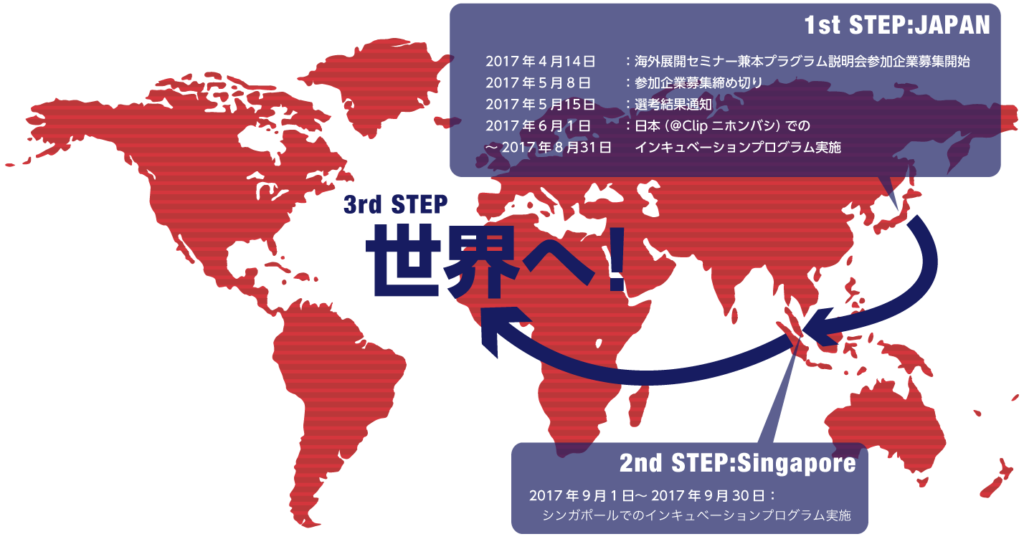 TOKYO & SINGAPORE—IP Bridge, Inc and JFDI Pte Ltd today announced their agreement to launch a new program for Japanese Small to Medium Sized Enterprises (SMEs). The ManGO Factory Go Global Program aims to help SMEs across all industry sectors that have “buried intellectual property (IP)” to exploit it internationally through joint ventures, partnerships, licensing or franchise.
TOKYO & SINGAPORE—IP Bridge, Inc and JFDI Pte Ltd today announced their agreement to launch a new program for Japanese Small to Medium Sized Enterprises (SMEs). The ManGO Factory Go Global Program aims to help SMEs across all industry sectors that have “buried intellectual property (IP)” to exploit it internationally through joint ventures, partnerships, licensing or franchise.
The ManGO Factory Go Global Program will start in April 2017 with around ten SMEs receiving mentoring from IP Bridge and JFDI.Asia in Tokyo collaborating with Mitsui Fudosan’s co-working space, Clip Nihonbashi, to explore their potential to expand outside Japan. The program is motivated by Mitsui Fudosan’s ambition to co-create new ventures and industries with new partners and the mission of IP Bridge to help Japanese companies to create more wealth from IP that they are not currently exploiting globally.
 Satoshi Kanno, Director of IP Bridge, said: “Among the patent applications filed in Japan by Japanese companies, the rate of filing in other countries is only about 15% in the case of SMEs and about 30% in the case of large companies, even though the technologies behind such applications have high potential for global use. This program intends to help such companies with excellent ‘buried IP’ to connect with partners internationally”.
Satoshi Kanno, Director of IP Bridge, said: “Among the patent applications filed in Japan by Japanese companies, the rate of filing in other countries is only about 15% in the case of SMEs and about 30% in the case of large companies, even though the technologies behind such applications have high potential for global use. This program intends to help such companies with excellent ‘buried IP’ to connect with partners internationally”.
The ManGO Factory Go Global Program will be based in two locations that both support strong entrepreneur communities. Japanese SMEs will prepare for their international expansion at “31 Ventures Clip Nihonbashi” in Chuo-ku, Tokyo, with mentoring from IP Bridge and JFDI.Asia. Then, when they are ready to “Go Global”, the SMEs will spend up to three months in Singapore co-located with JFDI.Asia.
Hugh Mason, CEO of JFDI.Asia, said: “This program will be a bridge to bring Japanese technologies to those who can create wealth from them outside Japan, benefiting not only Japan but also people of all nations. Once we have proved the pathway for SMEs to take “Buried IP” out of Japan we then want to explore how this new bridge can also support international businesses seeking access to the Japanese market to bring their know-how to entrepreneurs in Japan”.
SMEs interested to participate in ManGO Factory Go Global Program or the below seminar in April should contact: [email protected]

Tentative Schedule for the ManGO Factory Go Global Program 2017
April 14th: Kickoff Seminar in Nihonbashi
Mid May: Selection of up to 10 candidates
Early June: Kick off gathering
June – August: SMEs prepare in Tokyo
September: SMEs make facilitated presentations to potential partners in Singapore
IP Bridge is the first and largest intellectual property fund management company in Japan. It was established in 2013 with a fund size of US $300 million provided by a major public-private fund Innovation Network Corporation of Japan and other investors. IP Bridge’s mission is to promote open innovation through the use of intellectual property. IP Bridge creates community and connections to encourage the sound development of industry. In addition to licensing its own patents, IP Bridge’s business includes creating and supporting new businesses with partner companies in Japan and overseas based on intellectual properties, and finding financial solutions based on intellectual properties.
IP Bridge currently holds more than 3000 Japan and foreign patents acquired from major companies in Japan and the United States, small and medium enterprises, universities, etc. Through a wide network of companies, financial institutions and universities IP Bridge promotes the utilization of its patents. The technical domains of the patents relate mainly to mobile communications, semiconductors, image codecs, displays and motors (automobiles, robots, consumer electronics, electronics), etc., but not limited to the ICT area, healthcare, environment. IP Bridge is promoting the use of intellectual property in a wide range of fields including energy, food related (functional foods, food processing), medical engineering collaboration.
IP Bridge staff includes both intellectual property experts who have been active in the intellectual property department of major Japanese companies for many years, as well as a team of experts from various fields such as corporate management, investment companies, financial institutions and law firms. This has allowed IP Bridge to establish a system that can respond to a wide range of intellectual property utilization models.


Being in the IP field myself, I’d like to point out that patents fall into two categories,
a) defensive where company wants to preserve freedom to operate
b) assertive where you want to carve out a technology moat for new products/services
c) ignore the trolling/submarine patents
Due to cultural reasons, Japanese are superlative technicians, as such they are unmatched when it comes to incremental quality improvements, Six sigma, and mass production. However, the relatively rigid hierarchy and often detailed processes (to support the quality controls) inhibit the more creative aspects of imagineering, articulating a new demand. It can be done, Sony’s Akio Morita was a rare genius in this regard and you also have mavericks such as Honda. But in general Japanese companies are not as well oriented towards services.(see https://www.linkedin.com/groups/2550005/2550005-6062218266724548610). Trying to find the next Sony (or service equivalent) is going to be a really interesting exercise